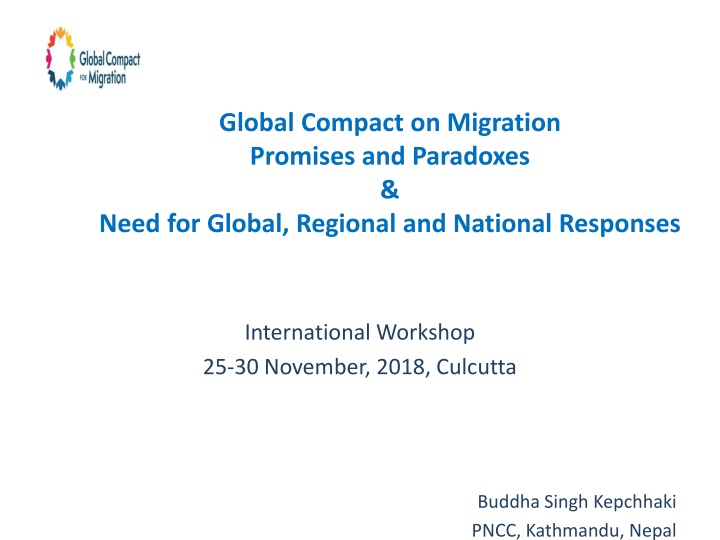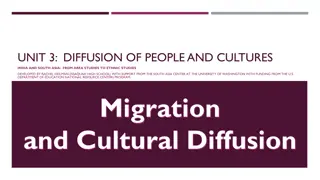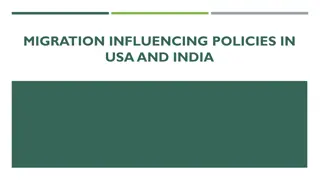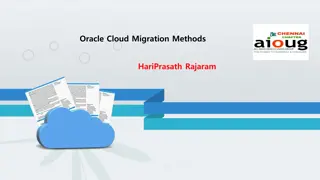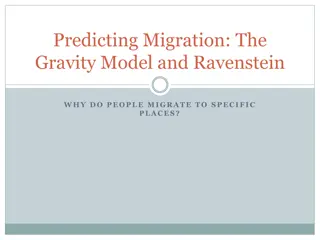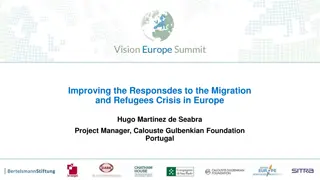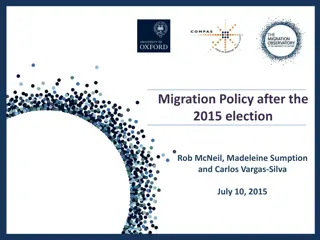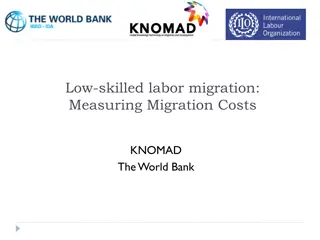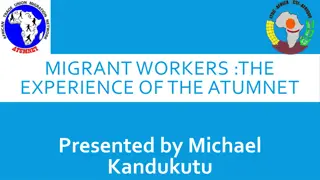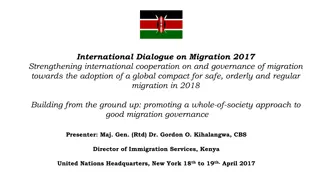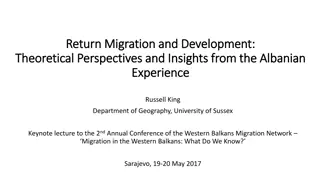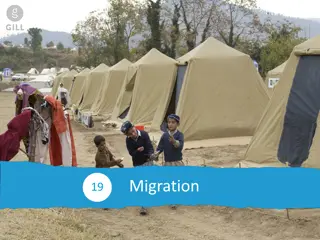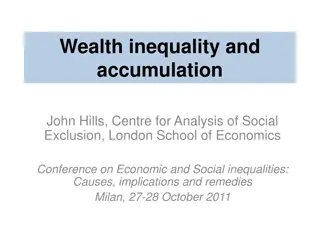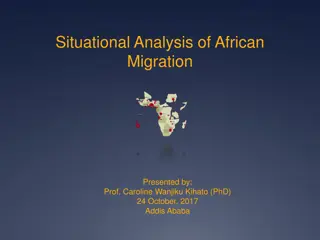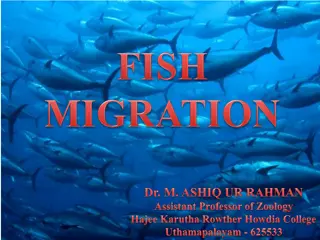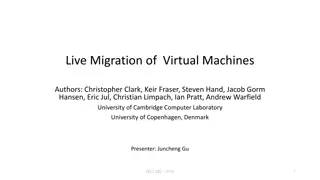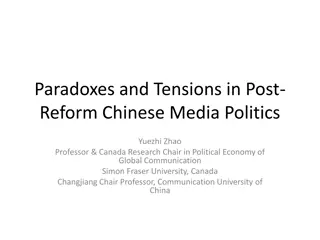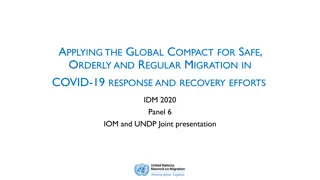Global Compact on Migration: Promises, Paradoxes, and Responses
International workshop discussing promises, paradoxes, and responses to migration issues at a global, regional, and national level. Topics include grievances of migrant populations, initiation of the Global Compact on Migration (GCM), and current status and negotiations on GCM implementation.
Download Presentation

Please find below an Image/Link to download the presentation.
The content on the website is provided AS IS for your information and personal use only. It may not be sold, licensed, or shared on other websites without obtaining consent from the author.If you encounter any issues during the download, it is possible that the publisher has removed the file from their server.
You are allowed to download the files provided on this website for personal or commercial use, subject to the condition that they are used lawfully. All files are the property of their respective owners.
The content on the website is provided AS IS for your information and personal use only. It may not be sold, licensed, or shared on other websites without obtaining consent from the author.
E N D
Presentation Transcript
Global Compact on Migration Promises and Paradoxes & Need for Global, Regional and National Responses International Workshop 25-30 November, 2018, Culcutta Buddha Singh Kepchhaki PNCC, Kathmandu, Nepal
Outline Context at National & International Level Grievance of migrant population in general Initiation & Status of GCM Promises & Objectives Paradoxes: conflict of interest Way Forward
Context International migration at high peak Trends of migrating to developed countries More push factors than pull factors 258 million migrant population at global level 32 million in gulf and middle east Category: migrant workers, refugees, asylum seekers
Homelessness Sexual Abuses Insecurity Grievances in General Exploitation Self Humiliation Restriction in Mobility Mental & Physical Torture
Initiation & Status of GCM UN General Assembly on 19thSept, 2016 on migration and refugee issues NY Declaration for Refugees & Migrants: 193 UN nations in recognized need for a comprehensive approach to human mobility & enhanced cooperation Series of consultations and negotiations through an open, transparent and inclusive process to draft on GCM Consultations as per the 6 different thematic issues with 24 sub-headings identified by The New York Declaration
Status and Negotiations on GCM Global Level First Intergovernmental Negotiations in NY 20-23 February 2018 Intergovernmental Negotiations on 12-15 March 2018 at UN HQ GCM draft adoption in Morocco in December, 2018 In Nepal On 15th August, 2017 Ministries and Departments of the GoN Dissemination of Nepal s Position Paper on 12 January, 2018 Multi-Stakeholders Consultations : On 30th August 2017 On 6thSeptember 2017 On 21 December 2017 Meeting of CP member on September 13th, 2018
What is GCM? a non-legally binding agreement grounded with cooperative approach to optimize the overall benefits of migration framed in consistent with target 10.7 of the 2030 Agenda for SDG tries to address risks and challenges for individuals and communities in countries of origin, transit and destination.
Values and Principles common Understanding and Shared Responsibilities, and Unity of Purpose on migration people-centred & international cooperation rule of law, due process & sustainable development human rights, gender-responsive, child-sensitive, Making Migration Work for All
Promises ? commitment from Member States to cooperate internationally to facilitate safe, orderly and regular migration protection of the safety, dignity and human rights and fundamental freedoms of all migrants, regardless of their migratory status, and at all times promotes the well-being of migrants and the members of communities in countries of origin, transit and destination commitment to eliminate all forms of discrimination, including racism, xenophobia and intolerance against migrants & their families contribution to enhanced/strengthened cooperation on international migration in all its dimensions by developing a cooperative framework forge Common Understanding and Shared Responsibilities, and Unity of Purpose on migration
Thematic Clusters One: The human rights of all migrants; social cohesion; inclusion; and all forms of discrimination, including racism, xenophobia, and intolerance Two: Addressing the drivers of migration, including the adverse effects of climate change, natural disasters, and human made crises, through protection and assistance, sustainable development, poverty eradication, conflict prevention and resolution Three: International cooperation and governance of migration in the cycle of governance Four: Contribution of migrants and diaspora, to all dimension of sustainable development, including remittance, and probability of earned benefits Five: Smuggling of migrants, trafficking in persons and contemporary forms of slavery, including appropriate identification, protection and assistance to migrants and trafficking victims Six: Irregular migration and regular pathways, including decent work, labour mobility, recognition of skills and qualifications, and other relevant measures
Core Objectives of GCM 1. Collect and utilize accurate and disaggregated data as a basis for evidence- based policies Minimize the adverse drivers and structural factors that compel people to leave their country of origin Provide accurate and timely information at all stages of migration Ensure that all migrants have proof of legal identity and adequate documentation Enhance availability and flexibility of pathways for regular migration Facilitate fair and ethical recruitment and safeguard conditions that ensure decent work Address and reduce vulnerabilities in migration Save lives and establish coordinated international efforts on missing migrants Strengthen the transnational response to smuggling of migrants 2. 3. 4. 5. 6. 7. 8. 9.
Core Objectives Contd 10. Prevent, combat and eradicate trafficking in persons in the context of international migration 11. Manage borders in an integrated, secure and coordinated manner 12. Strengthen certainty and predictability in migration procedures for appropriate screening, assessment and referral 13. Use migration detention only as a measure of last resort and work towards alternatives 14. Enhance consular protection, assistance and cooperation throughout the migration cycle 15. Provide access to basic services for migrants 16. Empower migrants and societies to realize full inclusion and social cohesion 17. Eliminate all forms of discrimination and promote evidence-based public discourse to shape perceptions of migration
Core Objectives Contd 18. Invest in skills development and facilitate mutual recognition of skills, qualifications and competences 19. Create conditions for migrants and diasporas to fully contribute to sustainable development in all countries 20. Promote faster, safer and cheaper transfer of remittances and foster financial inclusion of migrants 21. Cooperate in facilitating safe and dignified return and readmission, as well as sustainable reintegration 22. Establish mechanisms for the portability of social security entitlements and earned benefits 23. Strengthen international cooperation and global partnerships for safe, orderly and regular migration
Paradoxes: Conflict of Interest developed countries more focus on immigration and refugee issues threat to their national security and economic order developing countries and countries migration, a natural phenomena contributing to the economy and development of receiving countries treatment based on the principal of human rights and justice whether regardless of migratory status.
Way Forward concerted efforts at global, regional, national levels, including UN system build on the technical expertise and experience of relevant agencies within the UN system to support the efforts of Member States in implementation of objectives & actionable commitments Employ the technical expertise of the Regional Economic Commissions and UN country Teams to support implementation efforts of Member States at regional & national levels Align and review the set-up of the UN system on migration with the ongoing management and development system reform initiatives in order to ensure system-wide coherence
Way Forward Contd. Strengthen the role of the IOM in the UN system for the full and effective implementation of the Global Compact Establish a capacity-building mechanism that allows Member States, the UN and other stakeholders, including the private sector and philanthropic foundations, to contribute technical, financial and human resources to strengthen capacities of national & subnational authorities on migration bring our national actions and cooperation frameworks at all levels in line with the objectives and actionable commitments herein, taking into account our countries specific migration realities and priorities Implement the Global Compact in cooperation and partnership with civil society, migrant and diaspora organizations, cities and local communities, the private sector, trade unions, parliamentarians, National Human Rights Institutions, academia, and the media
